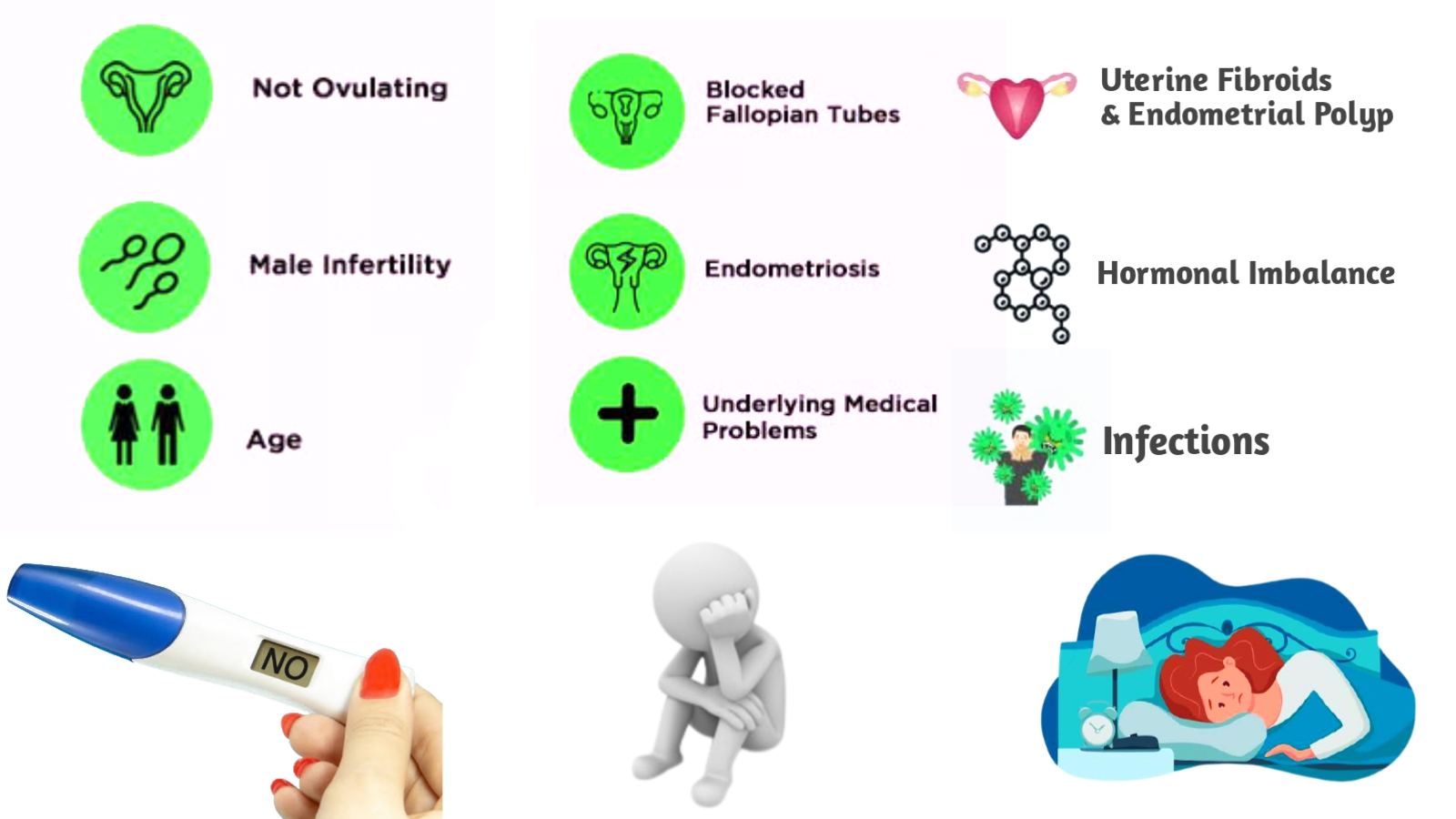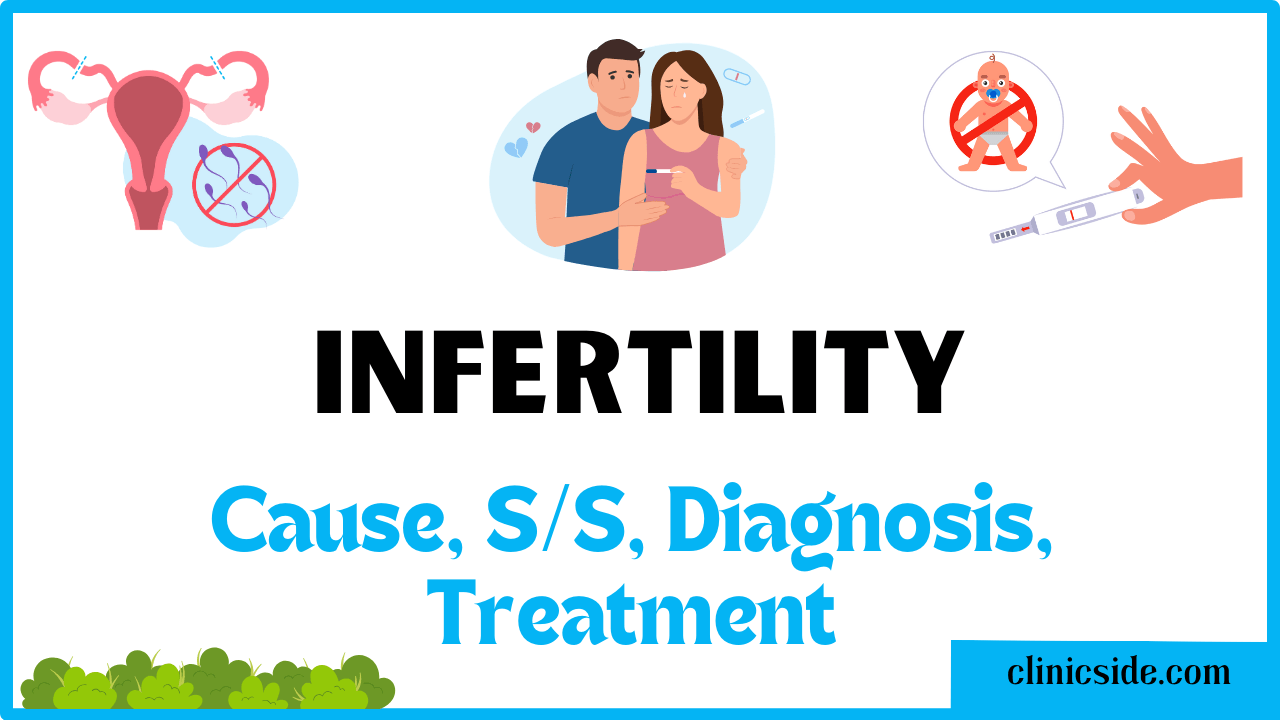What is infertility?
Infertility is the inability to conceive a child after having regular, unprotected sexual intercourse for a significant period of time (typically at least one year). It can be caused by a variety of factors, including hormonal imbalances, structural problems with the reproductive system, and underlying medical conditions. Infertility can affect both men and women.
There are two main types of infertility;
- Primary Infertility
- Secondary Infertility
What is Primary Infertility?
Primary infertility refers to the inability of a couple to conceive after trying for at least one year. It can be caused by a variety of factors, including hormonal imbalances, structural abnormalities, or underlying health conditions. In men, primary infertility can be caused by problems with the production or transport of sperm, while in women it can be caused by problems with ovulation or the uterus. If you are experiencing primary infertility, it is important to speak with a healthcare provider to determine the cause and discuss treatment options.
What is Secondary Infertility?
Secondary infertility is the inability to become pregnant or carry a pregnancy to term after previously being able to do so. It can be caused by a variety of factors, including changes in a woman’s age, hormonal imbalances, certain medical conditions, and previous surgeries or procedures. It can also be caused by male fertility factors, such as changes in sperm count or motility. If you are experiencing secondary infertility, it is important to speak with a healthcare provider to determine the cause and discuss treatment options.
In this modern age, the ratio of infertility has increased as compared to the last centuries due to the advancement of food and medications. There are a lot of causes that lead to infertility.

Some Causes of infertility in Males:
- Genetic Changes (like changes in chromosomes e.g., Klienfelters syndrome 44+ XXY)
- Congenital ( like undescended testes )
- Defects in spermatogenesis(formation of sperm) like problems in making healthy sperm. (this is the most common cause of male infertility)
- Thermal factor (Varicocele)
- Azoospermia (no sperm in the ejaculate)
- Loss of Sperm Motility
- Oligospermia (low sperm count)
- Testicular Disorders(like infection in the testes)
- Seminal Tract Disorders (like obstruction of the efferent duct)
- Sperm Antibiotics
- Hormonal Disorders ( abnormalities in the secretion of the hormone from the pituitary gland, hypothalamus, and testicles) like Gonadotrophin suppression
- Many environmental and lifestyle factors like excessive alcohol intake, smoking, and obesity.
- Enlargement of veins in the scrotum (varicocele)
- Cytotoxic and antidepressant drugs
- Radiation therapy
Causes of Infertility in Females:
There are many potential causes of infertility in females, including:
- Ovulatory disorders: These are problems with the release of eggs from the ovaries, which can be caused by hormonal imbalances or other factors.
- Pelvic inflammatory disease: This is an infection of the reproductive organs that can cause scarring and blockages in the fallopian tubes.
- Endometriosis: This is a condition in which the tissue that lines the uterus grows outside of the uterus, which can cause fertility problems.
- Uterine fibroids: These are non-cancerous growths in the uterus that can interfere with fertility.
- Polycystic ovary syndrome (PCOS): This is a hormonal disorder that can cause irregular periods, weight gain, and fertility problems.
- Age: Female fertility tends to decrease with age, especially after the age of 35.
- Lifestyle factors: Smoking, excessive alcohol consumption, and being overweight or underweight can all contribute to fertility problems.
- Previous surgeries: Some surgeries, such as those involving the reproductive organs or the pelvis, can cause fertility problems.
- Stress: Chronic stress can affect hormonal balance and ovulation, which can impact fertility.
Signs and Symptoms of infertility in females include;
There are several signs and symptoms that may indicate that a woman is experiencing infertility. These may include:
- Irregular or absent menstrual periods: Infertility can cause irregular periods or a complete absence of periods.
- Painful periods: Infertility can cause painful or heavy periods.
- Difficulty getting pregnant: If a woman is trying to get pregnant and has been unsuccessful after one year of unprotected sex, it may be a sign of infertility.
- Changes in hair and skin: Infertility can cause changes in hair and skin, such as excessive facial hair or acne.
- Pelvic pain: Infertility can cause pain in the pelvic area.
- Breast changes: Infertility can cause changes in the breasts, such as tenderness or swelling.
- Mood changes: Infertility can cause mood changes, such as depression or anxiety.
- It’s important to note that not all women who experience these symptoms have infertility, and some women with infertility may not experience any symptoms at all.
Risk Factors of infertility:
- There are several factors that can increase the risk of infertility, including:
- Age: Fertility tends to decline with age, especially in women. The risk of infertility increases significantly after the age of 35.
- Lifestyle factors: Smoking, excessive alcohol consumption, drug use, and being overweight or underweight can all increase the risk of infertility.
- Medical conditions: Certain medical conditions, such as polycystic ovary syndrome (PCOS), endometriosis, and sexually transmitted infections (STIs), can cause infertility.
- Environmental factors: Exposure to certain environmental toxins, such as pesticides and heavy metals, can increase the risk of infertility.
- Genetic factors: Certain genetic conditions, such as chromosomal abnormalities, can cause infertility.
- Previous surgeries: Certain types of surgery, such as removal of the uterus (hysterectomy) or the fallopian tubes (salpingectomy), can cause infertility.
- Medications: Some medications, such as certain chemotherapy drugs and certain types of antidepressants, can cause fertility problems.
- It’s important to discuss any potential risk factors for infertility with a healthcare provider, who can help identify the cause of fertility problems and recommend the appropriate treatment.
Diagnosis of Infertility:
Infertility is diagnosed when a couple has been unable to conceive after trying for one year (or six months if the woman is over 35 years old). To diagnose infertility, a healthcare provider will typically:
- Take a medical history: The provider will ask about the couple’s medical history, including any previous pregnancies, surgeries, and current medications.
- Perform a physical examination: The provider will perform a physical examination of both partners to look for any physical abnormalities or conditions that could affect fertility.
- Order laboratory tests: The provider may order laboratory tests to check hormone levels, assess sperm quality, or identify any underlying medical conditions that could be causing infertility.
- Recommend imaging tests: The provider may recommend imaging tests, such as ultrasound or X-ray, to evaluate the reproductive organs and look for any structural abnormalities.
- Refer to a fertility specialist: If the cause of infertility is not immediately apparent, the provider may refer the couple to a fertility specialist (also known as a reproductive endocrinologist) for further evaluation and treatment.
It’s important to see a healthcare provider if you are having difficulty getting pregnant, as early diagnosis and treatment can increase the chances of a successful pregnancy.
Treatments of infertility:
The treatment of infertility totally depends upon the cause of infertility. So before starting treatment, it is very important to test and diagnose the exact cause of infertility. Taking medications without finding the exact cause may lead to permanent infertility.
So once the physician finds the exact cause of infertility then the patient is treated according to the cause of infertility.
There are different natural methods to treat the causes of infertility. Physician mostly treats infertility with medicine, surgery, assisted reproductive technology, or intrauterine insemination.
It is better to make an appointment with a physician to treat the disease. Here we mention some tips to boost fertility in males and females.
To increase fertility in men and boost sperm count:
There are several things that men can do to increase their fertility and boost their sperm count:
- Maintain a healthy weight: Being overweight or obese can affect sperm production and motility.
- Exercise regularly: Regular physical activity can improve fertility and sperm health.
- Quit smoking: Smoking can reduce sperm count and motility.
- Limit alcohol consumption: Excessive alcohol consumption can reduce testosterone levels and impair sperm production.
- Avoid certain medications: Some medications, such as anabolic steroids and certain antidepressants, can affect sperm production.
- Get enough sleep: Sleep is important for overall health, including fertility.
- Reduce stress: Stress can have negative effects on fertility.
- Eat a healthy diet: A diet rich in fruits, vegetables, and healthy fats can improve fertility and sperm health.
- Avoid exposure to environmental toxins: Certain chemicals and toxins, such as pesticides and heavy metals, can affect fertility.
- Get enough vitamins C and D, and zinc.
Female infertility treatments include;
There are several treatment options for female infertility, depending on the cause of the infertility. Some common treatment options include:
- Ovulation induction: This involves the use of medications to stimulate the ovaries to produce eggs.
- Intrauterine insemination (IUI): This is a procedure in which sperm is inserted into the uterus through a catheter, to increase the chances of fertilization.
- In vitro fertilization (IVF): This is a process in which eggs are retrieved from the ovaries and fertilized with sperm in a laboratory setting, and the resulting embryos are transferred back into the uterus.
- Assisted reproductive technologies (ART): These are advanced fertility treatments that may be recommended for women with more complex fertility issues. Examples include gamete intrafallopian transfer (GIFT) and zygote intrafallopian transfer (ZIFT).
- Surgery: In some cases, surgery may be recommended to repair structural issues in the reproductive system that are causing infertility.
- Hormonal treatment to restore the level of hormones,
- Take Bee propolis twice a day,
- Dairy products like milk, yogurt, cheese
- Fertility restoration drugs,
- It’s important to work with a fertility specialist to determine the best course of treatment for your specific situation.
The best fertility drug for females to get pregnant is Clomiphene citrate but before taking it please make an appointment with a physician. This drug stimulates ovulation and secretes more FSH and LH that helps in the growth of ovarian follicles containing the egg.
If you are experiencing fertility issues, please do not hesitate to reach out to us. We have successfully treated over a thousand patients through a comprehensive approach that incorporates a blend of herbal and allopathic medicines. Our primary commitment is to ensure the safety and well-being of our patients, as we guarantee that the use of these medicines will result in no adverse effects and a 100% positive outcome.







You’re so awesome! I don’t believe I have read a single thing like that before. So great to find someone with some original thoughts on this topic. Really.. thank you for starting this up. This website is something that is needed on the internet, someone with a little originality!
Thank you for sharing such a comprehensive and informative
post about infertility. It’s great to see the causes,
risk factors, diagnosis, and treatments for both male and
female infertility laid out so clearly.
One thing that stood out to me was the impact that lifestyle factors, such as smoking, alcohol consumption, and weight, can have on fertility.
It’s a reminder that making healthy choices can have a
big impact on overall health and well-being, including fertility.
I also appreciated the mention of the importance of seeking medical advice and getting a proper diagnosis before starting any treatment for infertility.
It’s crucial to address the underlying cause of infertility in order to increase the chances of a successful pregnancy.
Thank you for sharing this valuable information.